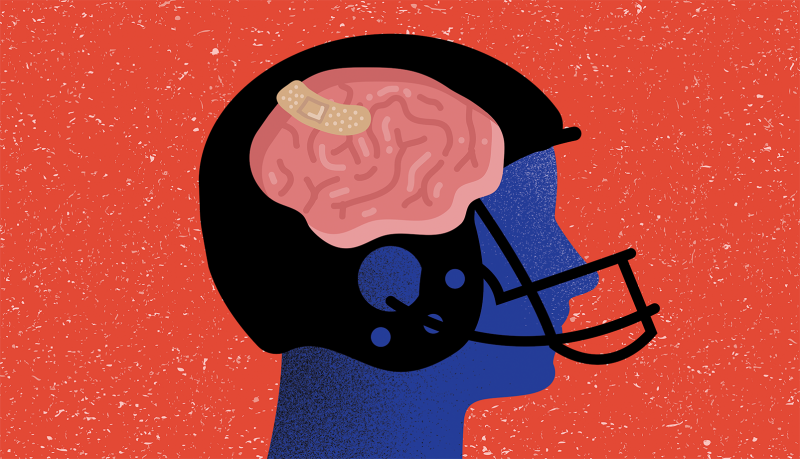The most dangerous part of having a concussion is going back to the game when the brain hasn’t fully healed.
Dr. Simon Tinawi, a physiatrist at the Montreal General Hospital, said concussions in contact sports are extremely common.
“Connections in the brain’s white matter, not necessarily in neurons, but in axons, which are the connections between one neuron and another, are disturbed,” said Tinawi, explaining what happens inside the brain during a concussion. “So nerve conduction velocity slows down, which is why people feel they’re not performing well.”
Tinawi added that if a connection must go from a neuron A to a neuron B, but is disturbed, it could go from A to C, and then from C to B, making a detour to finally connect with the right neuron. This means it’s a slower process and it’s the reason why, in general, people feel different after a concussion. They might be less focused, have headaches, and feel nauseous.
According to Mayo Clinic, other symptoms of a concussion could include ringing in the ears, vomiting, blurry vision, fatigue, dizziness, amnesia, and confusion or “feeling as if in a fog.”
Tinawi said that there is a lot of confusion between a concussion and a traumatic brain injury (TBI). TBIs are ranked as mild, moderate and severe, but concussions don’t use the same ranking system. A concussion is defined as a mild TBI.
According to The Centers for Disease Control and Prevention (CDC), a concussion is caused “by a bump, blow, or jolt to the head or by a hit to the body that causes the head and brain to move rapidly back and forth.”
Yet, a severe TBI can be caused by a fractured or crushed skull and can cause hematomas, or internal bleeding, which might require surgery in significant cases. In general, a concussion requires some rest and heals on its own.
Shanellie Marie Desparois, a student at Concordia University, said she got a concussion while doing Kyokushin Karate when she was younger.
“It was a mawashi kick, which kind of hooks your head with the foot. It was actually my favourite kick later on,” she joked. “You have headgear but it doesn’t really protect you from impact. I remember getting kicked in the head really hard […] and my brain kind of shook extensively. I could see little dots and I felt like I was going to pass out. Then 10 minutes after, I started throwing up.”
After the doctor told Desparois she had a concussion, he told her to rest and not to sleep for a few hours. She said she remembers her mother keeping her up for the rest of the night.
“After a concussion, the brain remains sensitive,” said Tinawi. “So returning to sports early while the brain hasn’t healed properly can be dangerous. We can see that, for example, if an athlete has a concussion playing a contact sport and gets back to the game too early, getting another hit on the head can be extremely dangerous. It can cause swelling and other serious complications. We call that second-impact syndrome (SIS).”
For these reasons, Desparois waited two months before fighting again or doing anything that could impact her head. She was only attending classes and doing warm-ups.
Concussions occur in all sports, especially contact sports such as football, hockey, and rugby, according to Brainline. Tinawi said that concussions are also common in boxing, soccer and martial arts.
Yet, the University of Pittsburgh Medical Center shows that 50 per cent of concussions go unreported or undetected.
Alexi Dubois, another Concordia University student and centre for the NDG Cougars, said he might have gotten a concussion playing hockey last year.
“I was in the corner and got hit from behind so I went head first into the boards,” said Dubois. “I did not go see a doctor because I wasn’t sure if I had a concussion and I didn’t think it was worth waiting in the emergency room for six hours to be told to lay in bed for a few days.”
Dubois added that he had no major symptoms of a concussion, such as nausea, or dizziness. He said he had headaches for a week, but didn’t stop playing other than missing one practice.
Gabriel Guindi, a Concordia University student, said he might have gotten a concussion while playing hockey.
“I’ve received pretty bad hits on the head so maybe I had one but I was never diagnosed,” he said.
Dubois and Guindi both didn’t see a doctor after a possible concussion because they believed it wasn’t too serious.
To assess if an athlete has a concussion, doctors use the SCAT 5, which is a test that helps asses if a person has a concussion during a sport. Tinawi explained that it helps determine if a person is confused or not and if they can tell what happened. Physical examinations are also required.
The CRT 5 is also available for non-professionals to recognize if someone just got a concussion. As well, according to Tinawi, if an athlete shows any symptoms of a concussion, it is important they rest and go to the doctor as soon as possible.
